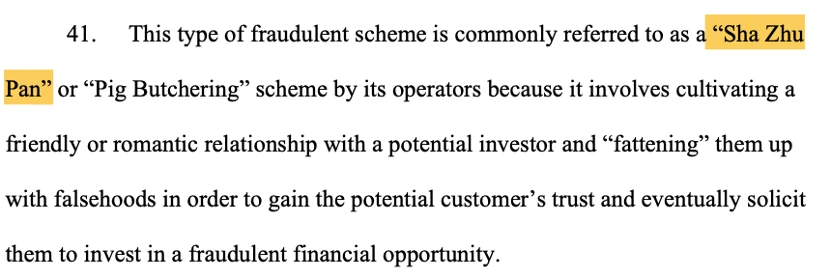Overview of the first digital asset “Ponzi scheme” case prosecuted by CFTC
CFTC's first prosecution of a digital asset Ponzi scheme.Case Overview
The U.S. Commodity Futures Trading Commission (CFTC) has recently brought its first case involving “romance scams.” According to reports, the CFTC has sued Justby International Auctions and its CEO Cunwen Zhu, alleging that the company misappropriated customer funds totaling $1.3 million, which should have been used for digital asset trading.
The CFTC’s lawsuit was filed in the U.S. Central District Court of California. According to the CFTC’s charges, Cunwen Zhu deceived at least 29 customers through his company Justby International Auctions between April 2021 and March 2022, and fraudulently obtained more than $1.3 million in funds.
These customer funds were supposed to be used for digital asset commodity and forex trading, which Justby was supposed to manage and profit from, but Cunwen Zhu used the funds for personal consumption and transferred most of the funds to bank accounts, digital wallets, and digital asset trading platforms controlled by employees involved in the scheme.
What are the specific methods of the “pig-killing ring”?
According to the CFTC, these scammers used social media to contact customers and “pretended to be friends or romantic partners” with them in order to persuade them to open accounts. The CFTC mentioned three types of people who played a role in this: (1) “recruiters” who contacted potential customers through social media and pretended to be friends or romantic partners with them in order to persuade them to open and fund trading accounts; (2) “trading companies” that claimed to represent potential customers in establishing trading accounts; and (3) “shell companies,” such as the defendant Justby, whose bank accounts were used by defendants and plan entities to receive and misappropriate customer funds.
- Amidst the warlord chaos of LSDfi, who will become the “King of Hanzhong”?
- In-depth analysis of the innovation and disruption of Uniswap V4
- Comparing Perp DEX protocol: GMX, Gains, dYdX…

Interestingly, the CFTC mentioned the pinyin of "pig-killing ring" in the lawsuit
The CFTC provided a very detailed description of the methods used by the pig-killing ring in the lawsuit. The document stated that the “recruiters” spent more than a year building a romantic relationship with a client before persuading them to open an investment trading account with their company and invest money. To achieve this goal, the “recruiters” often shared photos of their expensive lifestyle, records of driving luxury cars, and screenshots of fake accounts with high returns. These recruiters often claimed to be highly successful traders and often attributed their success to an “uncle” or “insider” who provided insider information.
Once scammed, they subsequently introduce clients to trading companies and set up trading accounts and payments. These trading companies themselves are legitimate, but the trading software downloaded by the influenced clients is not genuine trading software and provides various false information. Typically, if the client follows the investment advice of the “recruiters” and trades on the software, the trading software will show considerable profits. CFTC’s lawsuit documents show that one defrauded client’s account displayed false profits exceeding two million dollars.
Reaction and Suggestions from CFTC
The US Commodity Futures Trading Commission (CFTC) has issued multiple customer protection fraud warnings and articles, including “Avoiding Romance Scams Involving Forex, Precious Metals, and Digital Assets,” warning users to be alert to the increasing scams on online dating and social media platforms that lure victims into sending money to fraudulent websites that claim to trade forex, precious metals, or digital assets.
In its ongoing lawsuits against Zhu and Justby, the CFTC seeks compensation for defrauded clients, disgorgement of illegal profits, civil fines, trading bans, and permanent injunctions against further violations of the Commodity Exchange Act (CEA) and CFTC regulations. This incident indicates that regulators are increasingly focusing on and taking action against fraudulent activities in the cryptocurrency field. It can be foreseen that the regulatory efforts will be greater due to the difficulty of tracking the flow of money in financial cases related to digital currencies.
“When people try to escape the isolation during the pandemic and establish connections with others online, scammers see a new opportunity to exploit the public and commit fraud,” said Ian McCaleb, CFTC’s Director of Enforcement, in a statement. “Today’s action is the CFTC’s first lawsuit of this kind (referring to romance scams), showing that the CFTC will hold unethical individuals accountable for defrauding customers and protect the public from internet scams.”
We will continue to update Blocking; if you have any questions or suggestions, please contact us!
Was this article helpful?
93 out of 132 found this helpful
Related articles
- SatScribe: Game rule changer for rare sat hunting
- Messari: Uniswap V4, the moment for the platform of crypto applications
- Circle restarts buying US treasury bonds as USDC reserve assets
- Messari: Exploring the Evolution of the Web3 Community
- Viewpoint: Arbitrum leads the way into the Layer3 era, Orbit’s innovation and risks
- Is the trend of ordinals spreading to ETH a return or a throwback?
- Long Push: The Opportunities and Challenges of the L3 Era with the Launch of Arbitrum Orbit






